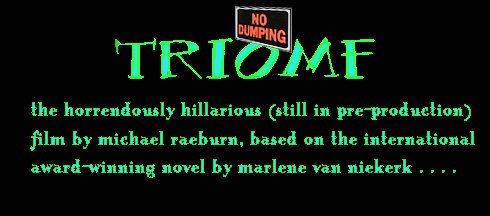A deeply disturbing thought suddenly occurs: Michael Raeburn, distinguished director of Triomf, the film that is surely going to be one of the most talked-about South African films of our time, is another of those infernal immigrants from Zimbabwe. Zounds!
Let's face it: no matter what internal problems all South Africans share, one thing everybody there ought to be able to agree upon is the simple and straightforward idea of building a massive, unbreachable, impenetrable, unscalable wall all across the entirety of the Zimbabwean border. Preferably financed by the United States, using technology, know-how, and leftover spare parts from the USA's own re-Berlin-ificaton of the Mexican border. Which is scheduled to be completed weeks after we sign off on Mission Accomplished II: The Sequel in Iran (Oops -- I meant Iraq; we Americans have trouble keep you foreign lands straight.) (In any meaning of the word.)
Now, as a native-born American of sturdy, unswarthy European stock, whose forebears on either side of the family arrived almost entire decades before the last half of the Twentieth Century, there's nothing that irritates me like illegal immigrants. Not to say that Michael, whose work permits are every bit as in order as the rest of the production's, is illegal, but still....
Well, now that I've got that pot properly stirred, I'd like to move on to other profound thoughts Zimbabwean....because some Americans, if you haven't heard, are about to become minor experts on the place. A couple few weeks ago, we sat around Michael's ultra-chic Parisian flat in its fashionable district (okay, his chic Parisian flat in its questionable neighborhood) (alright, ok, his funky but entirely serviceable flat... but it's damn well in Paris) while I showed Jose' [Triomf's sound engineer] and Michael the website counting down the last few hours before the Dispatch concerts at Madison Square Garden benefiting Zimbabwe. I'll go into more detail about that and those shows in times to come but both Michael and Jose', who's originally from Mozambique, raised the worthy question of "How do they get the money they've raised to the people who need it most, instead of the people who figure they need it most because they're running the country?"
Dispatch, a band hardly anybody over the age of 30 outside of New England had ever heard of, and one that had been broken up for three years, decided they were going to reunite long enough to do a benefit show for the people of Zimbabwe. As things fell together, the show ended up being scheduled for New York City's Madison Square Garden, and it sold out within minutes of tickets being put on sale. So a second and then a third night were put on sale, both of which sold out instantly as well. The band turned over their own guest list tickets in order to raise more funds, and some pretty significant sums were raised. And the question of how to disburse those funds is central, obviously.
But as anyone who's ever been around a successful benefit knows, a huge part of it is not based in fund-raising but in consciousness-raising.... There are now a couple of hundred thousand American kids (consider exactly how fast those tickets sold out, and do a little math based on those lucky ticket holders actively bragging to all their friends, and multiply by Myspace....) who now know at least a little something about a remote Southern African country named Zimbabwe..... Okay, now all the Americans say it in unison: ZIM - BOB - WAY ....
Which brings us back again to Triomf and South Africa and Michael Raeburn, all by way of Zimbabwe. Because as we explore the nuances and the crashing non-nuanced plain-as-day non-subtleties of the making of Triomf in South Africa at this moment, we're inevitably going to run afoul of all manner of sensibilities, delicate and refined, crude and rude. And as we do, we're going to keep reminding you of a few important facts. Beginning in the 1960s, under Ian Smith's Rhodesian regime, Michael Raeburn, a native born African who would most often be defined as "white," began making films and books that powerfully questioned the status quo. As each decade's events unfolded, he continued to do so, despite the fact that he was now banned from his native land. And when that land became known as Zimbabwe, one of his books became a primary text in its schools. His film Jit, with the music of Oliver Mtukudzi, Thomas Mapfumo, and the Bhundu Boys among others, was the first film ever made entirely in Zimbabwe. And by the time of our own decade, Michael had once again been banned from his homeland for making a film, Zimbabwe Countdown, that examined the regime that has ruled Zimbabwe since its promising birth.
We bring this forward not to blast forth Michael's horn on his behalf but because it needs to be said. Consistently, in five different decades, this African filmmaker has made films about Africa in Africa. When he wasn't allowed in Rhodesia/Zimbabwe, he made them in Tanzania, Zambia, and South Africa. When he wasn't allowed to complete a South African film named Soweto, he moved on and made others. And now, in a time when many people would question his wisdom, he's preparing to shoot a South African picture called Triomf about a lower-class white Afrikaans-speaking family who may not be the model citizens some might wish. Do you think he has any idea what he's doing?
Tuesday, 14 August 2007
A Disturbing Thought Or Two
Posted by
barb rochechourt
at
15:27
![]()
Labels: Bhundu Boys, Dispatch, Michael Raeburn, Oliver Mtukudzi, Thomas Mapfumo, Triomf, zimbabwe
Subscribe to:
Post Comments (Atom)












No comments:
Post a Comment